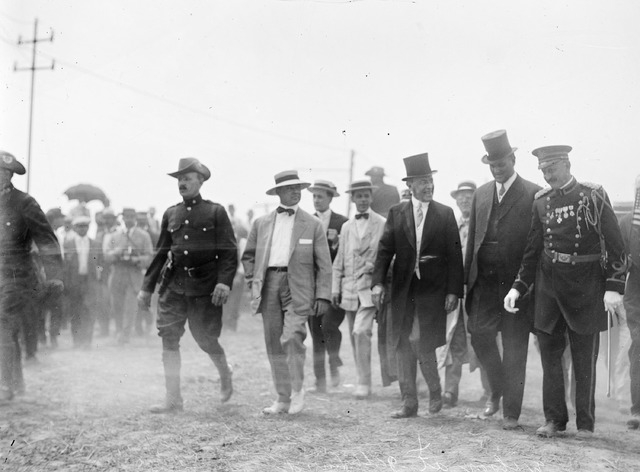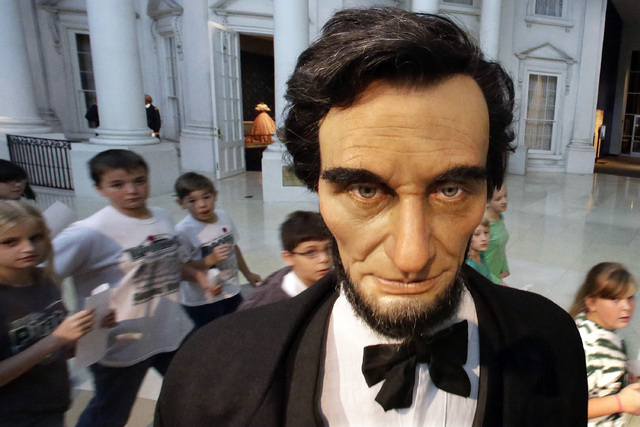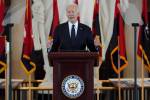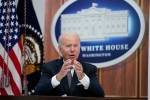Gettysburg Address: A sacred, yet elusive, text in American culture
GETTYSBURG, Pa.
Like the Pledge of Allegiance or “The Star-Spangled Banner,” the Gettysburg Address is a sacred American text, so fully absorbed into the culture that phrases such as “four score and seven years ago” and “of the people, by the people, for the people” are as familiar as any song lyric or line of poetry.
But it’s an elusive text, as well.
No definitive edition exists of the speech that countless children have memorized. Praise for Abraham Lincoln’s language has far exceeded any attempts to emulate it. And anniversaries have been marked only sporadically by Lincoln’s successors, including Barack Obama, a self-styled Lincoln admirer who will not attend Tuesday’s 150th anniversary gathering.
“My only guess is that the bar seems permanently set too high,” Lincoln historian Harold Holzer says. “There’s no other explanation for why acclaimed orators like Bill Clinton and Barack Obama would shy away from the challenge.”
The Gettysburg Address is impossibly profound; intimidatingly brief, under 300 words; and unusual among great American speeches, in part because the occasion did not call for a great American speech. Lincoln was not giving an inaugural address, a commencement speech or remarks in the immediate aftermath of a shocking national tragedy, such as the bombing of Pearl Harbor or the Sept. 11 attacks.
“No one was looking for him to make history,” says the Pulitzer Prize-winning Civil War historian James McPherson, who added that the event was planned by Pennsylvania officials, not by the Lincoln administration.
Presidents traveled infrequently in Lincoln’s time and his presence was important, but not essential at Gettysburg. The timing of the Gettysburg National Cemetery’s dedication — four months after Union forces under Gen. George Meade turned back Gen. Robert E. Lee’s troops — was determined not by Lincoln’s schedule, but by the availability of Edward Everett, a celebrated orator whose two-hour speech preceded the president’s “Dedicatory Remarks.”
Memories of Gettysburg only sharpened in hindsight. Accounts differ on everything from the day’s weather to how long the crowd applauded, if at all. Original transcriptions differ, and scholars still debate the speech’s exact length, usually ranging from 268 to 272 words.
In his Pulitzer Prize-winning “Lincoln at Gettysburg,” Garry Wills refuted the legend that Lincoln casually jotted down a few thoughts, or improvised his speech. He also noted at least two major breakthroughs.
Lincoln’s reasons for fighting the Civil War were steadily evolving. By Gettysburg, the original goal of preserving the union had been displaced by the profound and politically risky statement that democracy itself rested upon “the proposition that all men are created equal.” Slavery and the doctrine of states’ rights would not hold in the “more perfect union” of Lincoln’s vision.
“Up to the Civil War ‘the United States’ was invariably a plural noun: ‘The United States are a free country.’ After Gettysburg it became a singular: ‘The United States is a free country,’” Wills wrote. “This was a result of the whole mode of thinking that Lincoln expressed in his acts as well as his words, making union not a mystical hope but a constitutional reality.”
Lincoln’s other revolution was one of style. Wills noted that the Gettysburg Address came at a time of great technological change, when communication was hastened by the rise of the telegraph, an innovation that demanded concise language. Gettysburg is far easier to read now than other speeches of the 19th century, Everett’s included. But it took decades for Lincoln’s approach to catch on.
“To a surprising degree, it was revered and ignored,” says historian Ted Widmer, editor of a Library of America anthology of U.S. oratory. “Everyone loved it, but speeches continued to be longwinded throughout the 19th century.”
Composed in wartime, the address was immediately caught up in the North-South divide and remained there long after. Republican newspapers welcomed it, Confederate newspapers ignored it. An anti-Lincoln paper from the North, the Chicago Times, denounced Lincoln for “an offensive exhibition of boorishness and vulgarity.”
Decades later, in an essay still cited by neo-Confederates, H.L. Mencken praised the speech as “eloquence brought to a pellucid and almost gemlike perfection,” before advising that Lincoln was making poetry, “not logic.”
“The doctrine is simply this: that the Union soldiers who died at Gettysburg sacrificed their lives to the cause of self-determination,” Mencken wrote. “It is difficult to imagine anything more untrue. The Union soldiers in that battle actually fought against self-determination; it was the Confederates who fought for the right of their people to govern themselves.”
In 1912, nearly 50 years after Lincoln spoke, the Gettysburg Address Memorial was unveiled. It’s a suitably handsome and succinct tribute, a bust of Lincoln fronting granite pillars of human scale and a pair of bronze tablets bearing the president’s immortal words.
After Lincoln, the first major presidential address at Gettysburg was given by Woodrow Wilson for the battle’s 50th anniversary, in 1913.
Some presidents used the occasion to advance a political program. President Franklin Roosevelt, who gave the 75th anniversary speech, did not mention race or regional divisions. His speech was an affirmation of the New Deal and the need to allow government to offset the power of private wealth.
“For the issue which he restated here at Gettysburg 75 years ago will be the continuing issue before this Nation so long as we cling to the purposes for which the Nation was founded — to preserve under the changing conditions of each generation a people’s government for the people’s good,” FDR stated.
John F. Kennedy seemed to embody both the worship and the wariness of the Gettysburg Address. He visited the cemetery in 1963, but gave no remarks. As if to acknowledge the futility of following Lincoln, he sent a message for the battle’s centennial in July 1963 that began, “Five score years ago ....”
An American president did mark the speech’s centennial in person. But it was Kennedy’s immediate predecessor, the Gettysburg resident and former World II commander, Dwight Eisenhower, whose theme was military service.
Thurston Clarke, author of two books on Kennedy, says that the president asked speech writer Theodore Sorensen to look into Lincoln’s “secret” as they prepared what became the most widely quoted presidential oratory of the 20th century, Kennedy’s inaugural address.
“Asking Sorensen to study Gettysburg before writing a draft of the inaugural is a good example of JFK’s ambition, of him swinging for the fences from his first moments in office,” Clarke says.
Jeff Shesol, a former speech writer for President Clinton and author of books on Presidents Lyndon Johnson and Franklin Roosevelt, says that Kennedy’s inaugural is the last speech he can think of that successfully captured Lincoln’s paradigm of poetry and concentration. He finds that recent presidents such as Reagan, Clinton and Obama often favor a more conversational style.
“We would’ve loved to write Lincoln for Clinton, but it just wouldn’t have fit; as (speechwriter Michael) Waldman used to say, ‘We give him Hemingway; he gives us Faulkner,’” Shesol wrote in a recent email. “And in this analogy, Lincoln is Hemingway. And as Lincoln speeches go, Gettysburg is of course as spare as it gets. So while we all certainly admired it — who doesn’t? — it made no real sense as a model.”





























